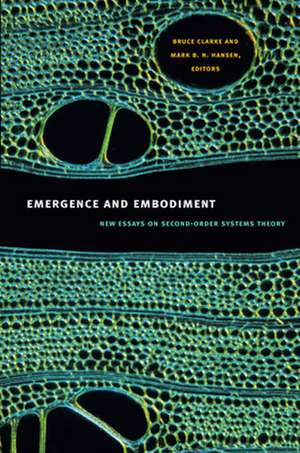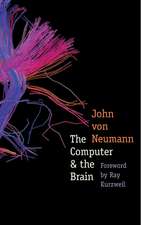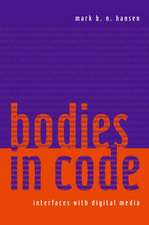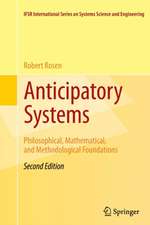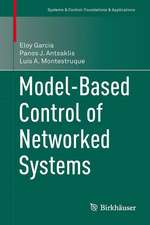Emergence and Embodiment – New Essays on Second–Order Systems Theory: Science and Cultural Theory
Autor Bruce Clarke, Mark B. N. Hansenen Limba Engleză Paperback – 29 oct 2009
Preț: 263.29 lei
Nou
Puncte Express: 395
Preț estimativ în valută:
50.38€ • 52.73$ • 41.93£
50.38€ • 52.73$ • 41.93£
Carte tipărită la comandă
Livrare economică 31 martie-14 aprilie
Preluare comenzi: 021 569.72.76
Specificații
ISBN-13: 9780822346005
ISBN-10: 0822346001
Pagini: 296
Ilustrații: 4 illustrations
Dimensiuni: 161 x 237 x 25 mm
Greutate: 0.43 kg
Editura: MD – Duke University Press
Seria Science and Cultural Theory
Locul publicării:United States
ISBN-10: 0822346001
Pagini: 296
Ilustrații: 4 illustrations
Dimensiuni: 161 x 237 x 25 mm
Greutate: 0.43 kg
Editura: MD – Duke University Press
Seria Science and Cultural Theory
Locul publicării:United States
Cuprins
Contents; AcknowledgmentsIntroduction: Neocybernetic Emergence: Bruce Clarke and Mark B. N. Hansen; Interview with Heinz von Foerster; Interviewer: Bruce Clarke; Heinz von Foersters Demons: The Emergence of Second-Order Systems Theory: Bruce Clarke; The Early Days of Autopoiesis: Francisco J. Varela; Life and Mind: From Autopoiesis to Neurophenomenology: Evan Thompson; Beyond Autopoiesis: Inflections of Emergence and Politics in Francisco Varela: John Protevi; System-Environment Hybrids: Mark B. N. Hansen; Self-Organization and Autopoiesis: Niklas Luhmann; Space Is the Place: The Laws of Form and Social Systems: Michael Schiltz; Improvisation: Form and EventA Spencer-Brownian Calculation: Edgar Landgraf; Communication versus Communion in Modern Psychic Systems: Maturana, Luhmann, and Cognitive Neurology: Linda Brigham; Meaning as Event-Machine, or Systems Theory and The Reconstruction of Deconstruction: Derrida and Luhmann: Cary Wolfe; Complex Visuality: The Radical Middleground: Ira LivingstonBibliography; Contributors; Index
Recenzii
Emergence and Embodiment is an outstanding collection of sharp, well-crafted essays by prominent authors in the field of science and literature studies, all of whom have made major contributions to discussions of cybernetics, post-structuralism, and post-humanism. Here they demonstrate the viability of neo-cybernetics as a resource for resolving the dilemmas of the post-human raised by newer fields of artificial life, complexity theory, and cellular automata. Tim Lenoir, Duke UniversityEmergence and Embodiment provides a useful overview and detailed analyses of the complex field of neocybernetics and its major thinkers. It indicates the significance and breadth of interdisciplinary work being done in the wake of Humberto Maturana, Francisco Varela, Heinz von Foerster, and George Spencer-Brown, even as it makes demands on its readers to rethink some of their assumptions about the last forty years of theory in the humanities and the interdisciplinary social sciences.Robert Markley, author of Dying Planet: Mars in Science and the Imagination
Notă biografică
Textul de pe ultima copertă
""Emergence and Embodiment" provides a useful overview and detailed analyses of the complex field of neocybernetics and its major thinkers. It indicates the significance and breadth of interdisciplinary work being done in the wake of Humberto Maturana, Francisco Varela, Heinz von Foerster, and George Spencer-Brown, even as it makes demands on its readers to rethink some of their assumptions about he last forty years of 'theory' in the humanities and the interdisciplinary social sciences."--Robert Markley, author of "Dying Planet: Mars in Science and the Imagination"
Descriere
Explores the cultural legacy of cybernetics and neocybernetics that offers new insight on the role of the human in an era of the posthuman
